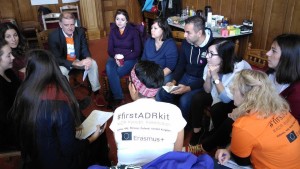During the first week of October this year we were privileged to be part of a group of people exploring conflict resolution tools in youth and volunteer work. A recent blog on this topic was posted here by Virginia Vilches Such, who was involved in a similar project. We would like to echo her thoughts here and share our own.
Our project is a European Commission funded two-year Erasmus+ strategic partnership – a non-formal learning programme coordinated by Youth Development and Integration Association STRIM, a Polish NGO offering services in youth work and volunteering. Alongside STRIM there are partners in Estonia, Italy, Norway and the United Kingdom. The project title is First ADR Kit and the aim is to promote awareness of better conflict resolution through mediation to youth workers who themselves will develop these skills and then pass them on to youth in their own workplaces, working with volunteers in social and educational projects across Europe.
Twenty trainees from the five countries in the partnership, three trainers and one project manager came together for the first week of mediation training in the pretty English town of Worcester. The venue for the training was perfect – the former courtroom in the town’s Guildhall. A lovely old wooden-panelled room and just the right place to practice non power-based and consensual conflict resolution.
The training week was remarkable for many reasons. The energy levels brought into the project by the trainees were unusually high. The relevance of transferring skills in managing difficult conversations, in empathy, and in understanding interests and needs to real-life situations in the lives and work of the participants was keenly felt by everyone. This mediation training took us all far away from formal mediation and ADR processes and right into the ways in which we communicate in everyday situations. We were working on skills and underlying mindsets and changing the ways in which we approach conflict. We asked probing questions about our own roles in using mediation skills in settings where we ourselves work and have our own interests. In this kind of setting, we are not external neutrals who enter an organisation, intervene, and leave again, and this means that reflection on our roles as “mediators” is crucial.
The power of mediation to bring about change was joined here by another power. This was the power of non-formal learning. It transforms the usual perceptions of and relationships between trainers as experts and participants as learners. Here, we were all learners. The trainers learned to adapt their methods and tools to the needs of the group in empowering ways, and to tap into the energy that the participants together generated. Energisers – a feature of youth work training that the trainers had not encountered in their more formal mediation training with lawyers and students to date – played a key role in group dynamics. Imagine us all doing vigorous physical and verbal energy exercises many times a day, working on the floor instead of on chairs, using nonverbal communication and space as key elements of learning. Something that we can surely take back to our work with lawyers and students.
Mediators believe in the power of mediation to transform disputes and conflicts, to make workplaces better, and to change lives. Mediation is more than just a formal step-by-step structure leading to the material settlement of a dispute. In the context of this project, nothing could be truer. Here are some comments from participants a few days after the training:
“First ADR Kit proved that it is possible to move from the formal to the informal and apply mediation skills in a non-formal setting of youth community and voluntary organisations” (Leila Usmani, UK).
“I tried mediation today on my daughter and her friend next door. One was not happy with how the other acted and it turned into shouting. I practiced the loop of understanding and paraphrasing and in the end they calmly told each other what they needed and agreed on it. Feel like a superhero” (Tatjana Mihnovits, Estonia).
“During the training I understood that having a problem we usually ask someone else to solve it, look for the easiest solution, or try to grab the biggest piece of the pie. But the solution is in our own hands. Without listening to the other side it’s nearly impossible to find the best possible resolution. Mediation really works!” (Olga Sokolova, Estonia).
Participants will receive an Erasmus+ YouthPass certificate as one outcome of this training course. In this they will write their own definitions of skills gained – again a non-formal and empowering learning tool.
Mediation is powerful. Add non-formal learning and dissemination into young people’s workplaces and lives and the power grows and grows. This project continues through 2017 with a follow-up workshop in Italy where the participants will develop their own conflict training tools for their own work, a research project into the training of conflict resolution in youth programmes in Europe, and a handbook of tools to be made available to youth and volunteer organisations. Readers can follow the project on www.firstadrkit.org and Facebook.
________________________
To make sure you do not miss out on regular updates from the Kluwer Mediation Blog, please subscribe here.




A really well written piece on non-formal learning. As the authors point out, when we move out of the formal role of teacher and join the class as fellow learners, everyone’s learning is enhanced.